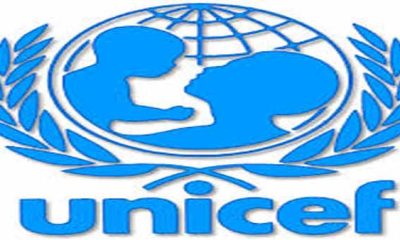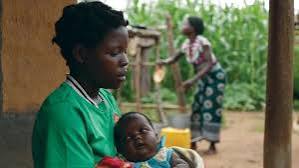News
Every Child Has Rights To Routine Immunisation Against Life Threatening Diseases – UNICEF

-Moves To Increase The Rate Of Vaccinated Children By 50 Per Cent
Each Year
-Seeks Media Support
The United Nations Children Funds (UNICEF), on Wednesday, posited that immunisation is an essential right of every Nigerian child in preventing life threatening diseases and infection.
Chief UNICEF Field Office for Southwest Nigeria, Celine Lafoucriere, stated this
while delivering her opening remarks at a two-day media dialogue on routine immunisation in Lagos.
CityMirrorNews reports that the theme of the media dialogue is: ” Achieving the Health Sector SDGs for Over Two Million Children at Risk of Death in Nigeria: A Media Dialogue to Routine Immunization and to Reduce Zero Dose Children”.
Speaking, Lafoucriere said that 2.3 million children had yet to receive vaccines in Nigeria.
“We still have a very pressing challenge in Nigeria where 2.3 million children still have received no vaccines at all.
“These are called the zero doze children and are mostly in marginalised areas, hard to reach areas and vaccines remain essential to their health.
“Vaccines is an essential fundamental right to every child and they remain fundamental to improving health outcomes and reducing inequalities”, she said.
Lafoucriere, however, said that to address this challenge, UNICEF in partnership with government and other partners has prioritised areas with the highest concentration of zero dose children.
She said that the idea is to increase the rate of vaccinated children by 50 per cent each year and 30 per cent by 2025.
“To achieve this in Nigeria, UNICEF together with the government and other partners , we have prioritised 100 local government areas across 18 states with the highest concentration of those zero dose children that need us.
” They need us right now and we need you , the media to join hands to accelerate the rate of immunisation in Nigeria to ensure that by each year we increase the rate of vaccinated children by 50 per cent.
“This cannot be done without you, please join hands with us today to ensure that we can leverage your influence.
Lafoucriere also appealed to the media to assist UNICEF in sensitising Nigerians on the importance of vaccines.
“Your own influence is very important. You can catalyse actions, help dispel rumors and misinformation about vaccines.
“By working collectively, we can build a resilience health system that is capable of reaching each and every child leaving no one behind.
“No matter where they live, we must ensure that no child in Nigeria suffers from preventable diseases.
Also speaking, Dr. Adeniyi Adebayo,
Assistant Immunisation Programme Officer, (LSPHCB) harped on the need for every child to be fully immunised.
Adebayo, who noted that vaccines formed the bedrock of economy development, said that zero dose children were those who were not immunised from birth.
He said children in that category were said to be prone to diseases and infections.
Adebayo also said that under-immunised children were the ones whose immunisation were not completed.
He said that all vaccines, immunisation in the country were free, urging parents to make best use of the opportunity to get their children immunised from birth.
Adebayo, however, identified infrastructural deficit as part of challenges confronting immunisation coverage in some part of country.
Speaking on the topic: “Leaving No Child Behind: The Role of UNICEF in Strengthening Childhood Immunization in Nigeria”, UNICEF Social Behavior Change Communication Specialist, Aderonke Akinola-Akinwole said there was the need for all stakeholders in join hand to ensure acceptability of vaccine.
She said: “My presentation is centered around the role of UNICEF in strengthening routine immunization in Nigeria.
As we know, this media dialogue is centered around zero dose children and the reason why this children still exist is because we have a sub-optimal uptake of routine immunization. So my presentation is centered around the strategic role UNICEF place in ensuring that vaccines are not just available for children but they are also potent and demanded for.”
“We all know govt cannot do it alone and there must be commitment in ensuring that routine immunization is brought as a major focus in the healthcare delivery system.
“For stakeholders, even if we don’t have children within the ages of 0-2 which is 0 to 15 months. We have a responsibility to propagate the importance of routine immunization for children. Tomorrow would come but tomorrow must meet children who are healthy to be able to take the future on. Hence, we have the responsibility to collaborate in ensuring that our future is taken care of and our children must be healthy for that future.”
“Vaccines are always available because UNICEF works with the govt at Nigeria and other international partners. What we see over the years is that the reality of our social economic factors and challenges are beginning to impede on vaccine acceptance and trust. So for example poverty remains one of the biggest challenges, if facilities are not as close as they are to the caregivers it may be difficult for them to take extra time to get to those facilities. So we need to ensure that at least every ward has a PHC that parents can access.”
“Secondly, the reality of socio-cultural norms let people believe that their family members never took vaccine and they are fine so why should they give their children. But we are working tirelessly with the communities in ensuring that ignorance is never an excuse, so you must ensure that you create messages that are culturally sensitive and relatable to ensure that vaccines intake is increased.”
“We engage all stakeholders in helping us to drive vaccine acceptance, so we engage all stakeholders.”
-

 News2 days ago
News2 days agoOkemesi Dies After Slipping Into Coma
-

 News4 days ago
News4 days agoRamadan: Osun Cleric Urges Compassion Among Muslims As Asejere Distributes Relief Materials To 537 Beneficiaries
-

 Crime3 days ago
Crime3 days agoCourt Commits Man To Life Imprisonment For Kidnapping Judge
-

 News3 days ago
News3 days agoPlateau: Nine Victims Of Barkin Ladi Attack Buried













